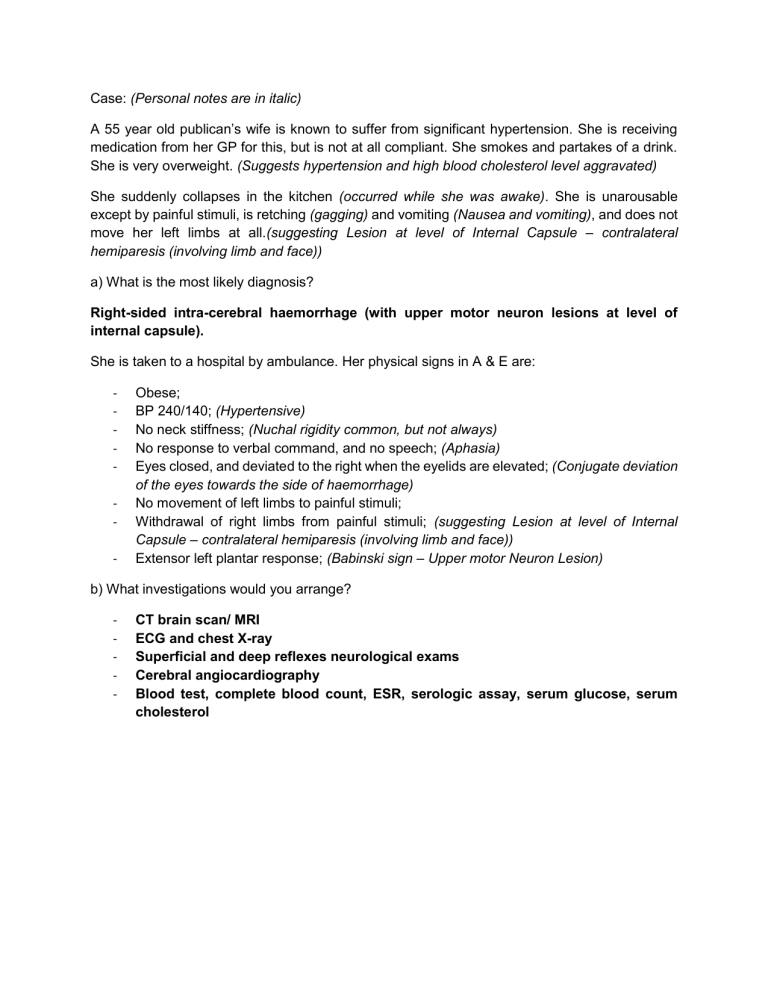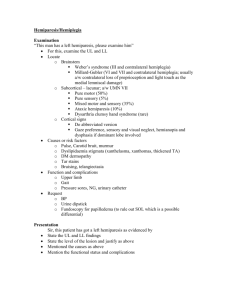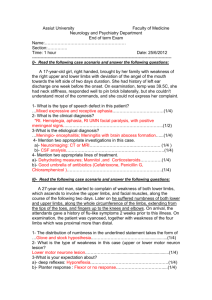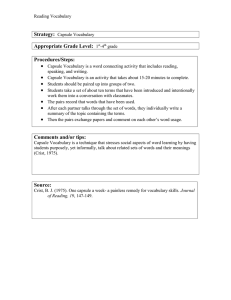Neurology Case Studies: Stroke & Subarachnoid Hemorrhage
advertisement

Case: (Personal notes are in italic) A 55 year old publican’s wife is known to suffer from significant hypertension. She is receiving medication from her GP for this, but is not at all compliant. She smokes and partakes of a drink. She is very overweight. (Suggests hypertension and high blood cholesterol level aggravated) She suddenly collapses in the kitchen (occurred while she was awake). She is unarousable except by painful stimuli, is retching (gagging) and vomiting (Nausea and vomiting), and does not move her left limbs at all.(suggesting Lesion at level of Internal Capsule – contralateral hemiparesis (involving limb and face)) a) What is the most likely diagnosis? Right-sided intra-cerebral haemorrhage (with upper motor neuron lesions at level of internal capsule). She is taken to a hospital by ambulance. Her physical signs in A & E are: - Obese; BP 240/140; (Hypertensive) No neck stiffness; (Nuchal rigidity common, but not always) No response to verbal command, and no speech; (Aphasia) Eyes closed, and deviated to the right when the eyelids are elevated; (Conjugate deviation of the eyes towards the side of haemorrhage) No movement of left limbs to painful stimuli; Withdrawal of right limbs from painful stimuli; (suggesting Lesion at level of Internal Capsule – contralateral hemiparesis (involving limb and face)) Extensor left plantar response; (Babinski sign – Upper motor Neuron Lesion) b) What investigations would you arrange? - CT brain scan/ MRI ECG and chest X-ray Superficial and deep reflexes neurological exams Cerebral angiocardiography Blood test, complete blood count, ESR, serologic assay, serum glucose, serum cholesterol A 42-year-old teacher has to retire from the classroom abruptly on account of the most sudden and severe headache she has ever had in her life. She has to sit down in the staffroom and summon help on the phone. The school secretary calls for an ambulance as soon as she sees the patient, who is normally very robust and is clearly in extreme pain. On arrival in the hospital A & E department, the patient is still in severe pain. Her BP is 160/100 and she shows marked neck stiffness but no other abnormalities on general or neurological examination. A clinical diagnosis of subarachnoid haemorrhage is made. She is admitted to the medical ward. a. What investigations would you arrange? - CT brain scan (suggestion of subarachnoid blood). - Lumbar puncture (verify if unequivocal, uniformly bloodstained CSF). b. How would you proceed now? - Neurosurgical referral. - Cerebral angiography



